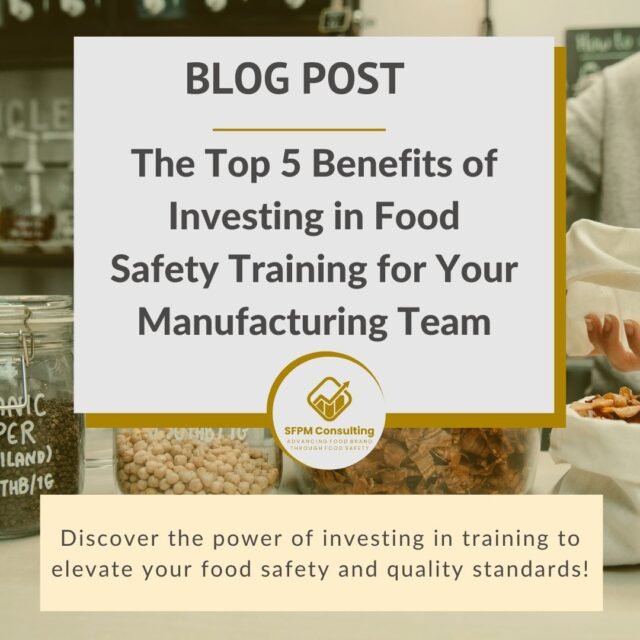[vc_row][vc_column][vc_video link=”https://youtube.com/embed/LJo_UB9Ojvk”][vc_column_text]Investing in food safety training for the manufacturing team is essential to achieve your food safety goals. By providing proper training, food operations can:
- improve product quality and safety
- comply with industry regulations and standards
- reduce the risk of foodborne illness outbreaks
- increase efficiency and productivity
- enhance employee morale and retention
- ultimately save costs
Improved Product Quality and Safety
One of the key benefits of food safety training for the manufacturing team is improved product quality and safety. Employees who are trained on proper food handling, hygiene practices, and quality control measures are better equipped to produce safe, high-quality food products. This includes understanding the importance of:
- maintaining cleanliness in the production area
- following proper storage and temperature control procedures
- implementing effective quality control checks
By ensuring that all employees are trained in these areas, businesses can significantly reduce the risk of contamination or other issues that could compromise product safety.
This not only protects consumers from potential harm but also helps to maintain customer satisfaction and brand reputation. When customers trust that a company’s products are safe to consume, they are likelier to continue purchasing from that brand.
Compliance with Industry Regulations and Standards
The food manufacturing industry is subject to various regulations and standards to ensure the safety and quality of food products. These regulations may vary depending on the country or region in which a business operates. Companies must stay up-to-date with these regulations and ensure compliance to avoid penalties or legal consequences.
Food safety training plays a crucial role in meeting these compliance requirements. By providing employees with the necessary knowledge and skills, businesses can ensure that their manufacturing processes align with industry regulations and standards.
This includes:
- understanding proper labelling requirements
- allergen control measures
- sanitation practices
- documentation procedures
Reduced Risk of Foodborne Illness Outbreaks
Foodborne illness outbreaks can have severe consequences for businesses, including negative impacts on public health, legal liabilities, and damage to brand reputation. Investing in food safety training for the manufacturing team can significantly reduce the risk of such outbreaks.
Proper training ensures that employees know potential hazards and how to prevent contamination. This includes:
- knowledge of proper food handling techniques
- temperature control measures
- hygiene practices.
By consistently implementing these practices, businesses can minimize the risk of foodborne illness outbreaks and protect their customers and brands.
Increased Efficiency and Productivity
Food safety training can also lead to increased efficiency and productivity in the manufacturing process. Employees trained on proper procedures and best practices can perform their tasks more effectively and efficiently. This includes:
- understanding how to handle equipment properly
- follow standardized processes
- identify and address potential issues or risks.
Businesses can reduce waste, minimize downtime, and streamline their operations by improving efficiency. This not only leads to cost savings but also allows for increased production capacity and faster turnaround times. Ultimately, this can help businesses meet customer demand more effectively and gain a competitive edge in the market.
Enhanced Employee Morale and Retention
Employee morale and retention are crucial factors in the success of any manufacturing team. Employees who feel valued, supported, and empowered in their roles are more likely to be satisfied with their work and stay with the company long-term.
Food safety training can enhance employee morale and retention by providing employees with valuable skills and knowledge. When employees feel confident in their ability to perform their tasks safely and effectively, they are likelier to take pride in their work and feel a sense of accomplishment.
Additionally, providing opportunities for professional development through training programs shows employees that the company is invested in their growth and success.
Cost Savings and Return on Investment
Investing in food safety training for the manufacturing team can result in significant business cost savings. Businesses can avoid costly expenses associated with these incidents by reducing the risk of contamination or other issues that could lead to product recalls or legal liabilities. Additionally, by improving efficiency and productivity, businesses can reduce waste and optimize their resources, leading to further cost savings.
Furthermore, food safety training is a valuable investment that can provide a high return on investment (ROI). The benefits of improved product quality and safety, compliance with regulations, reduced risk of outbreaks, increased efficiency and productivity, and enhanced employee morale and retention all contribute to a business’s overall success and profitability.
In conclusion, investing in food safety training for the manufacturing team is essential for businesses in the food industry. The benefits of doing this make it a worthwhile investment.
By prioritizing food safety training, businesses can ensure the safety and satisfaction of their customers while also protecting their brand reputation. Businesses must recognize the importance of food safety training and take action to provide their manufacturing teams with the necessary knowledge and skills.
Are you looking for food safety training to help your team follow better GMP and optimize your business operations? Let us know so we can help you streamline your GMP training effectively. Find a Time with Felicia Loo[/vc_column_text][/vc_column][/vc_row][vc_row][vc_column][/vc_column][/vc_row]

